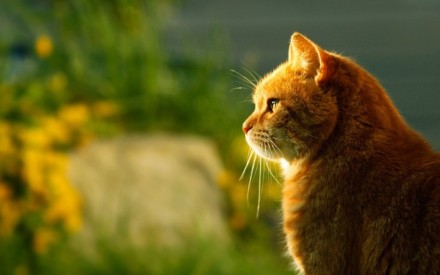Dear Folks,
If you hadn’t heard, September is Happy Healthy Cat Month!

So let’s make sure to honor and appreciate our feline companions and feline relatives (feline nieces, nephews, grandkitties, what have you 😸 ) for the remainder of the month and always! As we usher in Autumn, change tends to be on the mind. And as we recognize, especially this month, kitties and cats for the many ways they enrich our lives and all the reasons why we love them, let’s remember how change affects them.
In general, our feline friends are known for frowning upon change. 😾 In order to keep them at their happiest and healthiest 😻, this is an important thing to keep in mind, especially at this time of year. Again, with Fall comes change — young ones going back to school or moving to college, parents returning to work full-time, new schedules, perhaps a new face or two coming to stay for a while. Of course, cats can be affected by certain major changes that can happen at any time of year, such as a move or the loss of a family member or family friend. Two things to remember: moving away from a family member (or that family member moving away from us) can affect kitty just as significantly as the passing of a family member, and that having decreased contact with her humans (e.g. change in humans’ schedule) can also affect kitty’s mood.
To be the very best gato guardians we can be (¡NEW term ALERT! 😄) , we must be aware of certain “red flags” in kitty’s behavior. Here are some telltale signs our gatos give us to let us know they are not doing so well with this change. Let’s always be mindful of our cats’ wellness. After a change, let’s be aware of the following and do all that we can to help our cats cope:
1. A Change in Appetite
After a major change, cats may experience a loss of appetite. This is a potentially dangerous situation and not to be overlooked. In cats, a prolonged lack of eating can lead to inappropriate fat infiltration into the liver, a potentially fatal condition called hepatic lipidosis. If your cat refuses to eat for more than a day, contact your veterinarian and seek treatment.
2. A Change in Energy Level
A cat who is grieving or trying to process some other profound change may become markedly lethargic or extremely hyper. In either case, kitty is searching for emotional equilibrium. Be patient and a little extra forgiving to a cat who becomes ⚡The Feline Flash⚡ after a change. Burn off his extra energy with interactive play. Conversely, gentle play can help a lethargic cat get out of a funk.

3. A Change in Vocalization
Loneliness or loss can lead felines to become increasingly vocal, perhaps at odd hours of the day or night or with a different pitch or intonation than we’re used to hearing from them. On the other hand, a feline who is usually very vocal may become silent.
4. Increased Neediness
When faced with a change, some cats will cling to anything familiar. You may notice that kitty has become a lap magnet, and she may insist on sleeping with you. She may accompany you to the bathroom, check to make sure you’re okay in the shower, and even cry when you leave the house.
5. Searching for a Missing Companion or Friend
If a loved one has moved away (or if we have moved away from them), if a pet companion has disappeared, or if a family member has passed away, a grieving cat may look for them, even call out for them (i.e. change in vocalization). Kitty might stare out windows waiting for them to return or investigate places where his pal used to sit and hang out.

6. Depression
A grieving cat may lose interest in activities they once enjoyed or may approach playtime with less enthusiasm than normal. They may sit and stare for long periods of time rather than exploring their surroundings or observing birds out the window like they used to.
7. Stress-related Health Issues
Cats often respond to stressful change by exhibiting behavior such as over-grooming. The stress of grief can weaken a cat’s immune system and leave them more susceptible to respiratory infections or other illnesses. Stress can also lead to vomiting, diarrhea or constipation, and cystitis (swelling or infection of the bladder and urinary tract).
Be supportive and comforting toward your feline companion during times of major change or transition. Spend time simply sitting with him, talking to him, and giving reassuring pets or light massages. Remember to keep their routine as consistent as possible during this time. The amount of time it takes for your cat to adjust to a significant change will depend on her unique temperament, how close she was to the person or pet she is missing, and the support system she has around her.
Lastly — and most importantly — do not make the mistake of thinking your cat’s change in behavior is due to the stress of a change, when it may very well be the result of an illness. ALWAYS check with your veterinarian to make sure that changes in your cat’s appetite, energy level, or litter box habits are not due to a physical health problem.
Thanks for reading!.. Now go LOVE on those kitties!!! 💗💗🐱
Peace and Love,
Duck and Turtle

